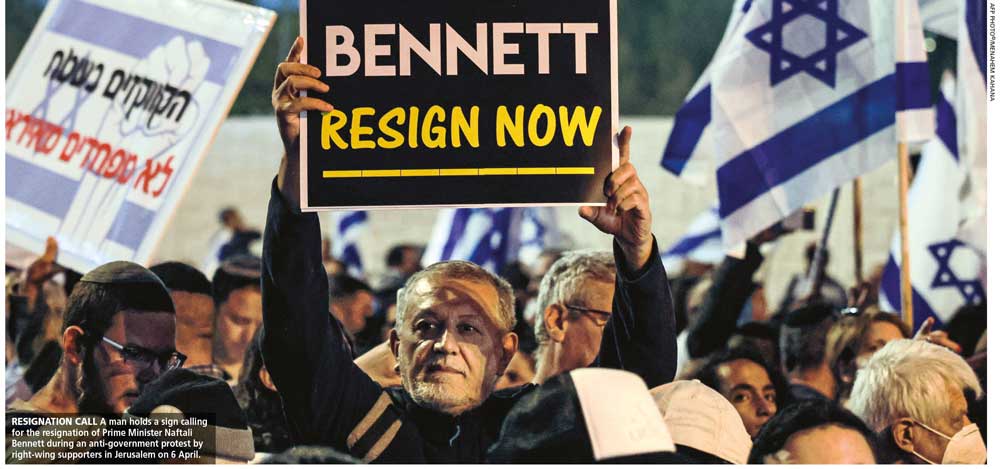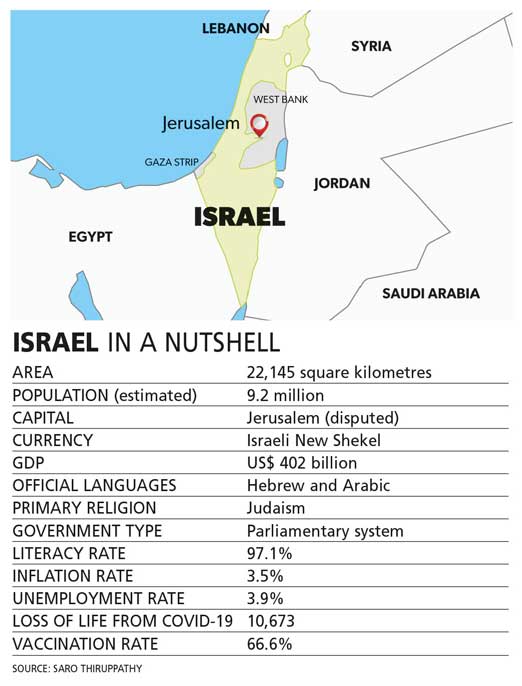ISRAEL TODAY

STARTUPS AND SETTLEMENTS
Monita Pesumal profiles the land of a mixed bag of people that’s in conflict with its neighbours

In August last year, the UAE made history when it became the first Gulf state to establish diplomatic relations with Israel. Bahrain established ties less than a month later.
For decades, most Arab nations had boycotted Israel, insisting they would establish ties only after the Palestinian dispute was settled. Bahrain is the fourth Arab country (after the Emirates, Egypt and Jordan) to recognise Israel since its founding in 1948.
 The Israeli-Palestinian conflict is one of the world’s most enduring struggles. Israelis and Arabs have been at war for decades over who gets what land and how it’s controlled. Jews fleeing persecution in Europe following the Holocaust wished to establish a homeland in what was then a majority Muslim territory. The Arabs resisted, seeing the land as theirs.
The Israeli-Palestinian conflict is one of the world’s most enduring struggles. Israelis and Arabs have been at war for decades over who gets what land and how it’s controlled. Jews fleeing persecution in Europe following the Holocaust wished to establish a homeland in what was then a majority Muslim territory. The Arabs resisted, seeing the land as theirs.
In 1947, a UN plan prescribed partitioning British-run Palestine into three separate entities: a Jewish state; an Arab one; and a separate enclave comprising Jerusalem, Bethlehem and other holy places, which would be under United Nations control. The proposal was accepted by Zionist leaders but rejected by the Arabs.
Today’s conflict reflects the outcomes of two subsequent wars: one waged in 1948 and the other in 1967. The 1967 war is significant as it left Israel in control of the West Bank and Gaza Strip, two territories with substantial Palestinian populations.
In today’s context, Israeli-Palestinian tensions are over which state gets what land and subsequently who controls which area.
Currently, the West Bank is nominally controlled by the Palestinian National Authority and remains under Israeli occupation while troops enforce security restrictions on the movement and activities of Palestinians. Palestinians who had received Israeli citizenship are often discriminated against.
The settlements that Israel has built in the West Bank are home to 500,000 people but are deemed to be illegal under international law. In the Gaza Strip, the humanitarian situation for the two million Palestinians has deteriorated. Gaza’s economy has collapsed and there’s a shortage of water, electricity and medicines.
On the other side of the struggle is Hamas – the largest of several Palestinian militant Islamist groups. Hamas is an Arabic acronym for the Islamic Resistance Movement; and under its charter, it is committed to the destruction of Israel. Gaza is controlled by Hamas but remains under an Israeli blockade.
Due to its geopolitical climate, Israel has had to employ out of the box thinking to survive.
Israel’s tech industry is its fastest growing segment and accounts for 35-40 percent of its GDP. The industry has contributed to sustainable solutions in communications, internet, medical systems, agriculture, biotechnology, security, water desalination, wastewater treatment and recycling, water management, digital printing and more.
Multinational tech companies such as Google, Apple, Facebook and Microsoft have research centres in Israel, although some local companies outdo them in terms of ingenuity and innovation with many specialising in drones, cybersecurity, autonomous driving and so on.
The country is sometimes referred to as a ‘startup nation’ due to the sheer number of budding entrepreneurs who have developed everything from ride sharing services and Viber to batteries that can charge a smartphone in a minute!
With a population of around 8.5 million, Israel is home to the largest number of startups per capita in the world – that’s one startup for every 1,400 people.
Israel’s natural resources can be attributed to the wealth of minerals harvested from the Dead Sea but also include copper, phosphates, bromide, potash, clay, sand, sulphur, asphalt and manganese.
Diamond cutting and polishing is another mega industry, and Tel Aviv plays host to the largest facility in the world. Israel is one of the world’s largest exporters of polished diamonds and a major centre for the trade in rough diamonds.
According to figures released by the Economy and Trade Ministry’s Diamond Controller, the total net polished diamond exports in the first quarter (Q1), which reached US$ 1.3 billion, showed an increase of 58 percent over Q1 in 2021.
The Israeli government has been thrown further into political chaos as Prime Minister Naftali Bennett lost his parliamentary majority in the Knesset when the coalition whip from his Yamina party announced that she was joining the opposition.
Israel may face fresh elections – or former Israeli prime minister and leader of the opposition Benjamin Netanyahu’s return to power. Netanyahu has been calling on more right-wing parliamentarians to defect from the ruling coalition.
“Go home because you are harming the Jewish identity of the country. Go home because you’re harming people’s livelihoods. Go home because you are neglecting Judea and Samaria. Go home because you’re weak – weak on Iran, weak on terror,” he says.
Netanyahu adds: “It is time for unity. It’s time to return home and come back to the national camp. Our door is open for anyone.”





Leave a comment